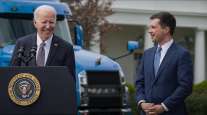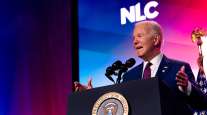Senior Reporter
Infrastructure Plan, FASTLANE Grants to Be Announced Soon, Chao Says

This story appears in the May 22 print edition of Transport Topics.
WASHINGTON — Details of a long-term infrastructure plan and the recipients of additional funding for freight projects will be announced soon, Transportation Secretary Elaine Chao told a Senate panel May 17.
An outline of President Donald Trump’s $1 trillion, 10-year plan to revamp the country’s highways, bridges and ports would be announced shortly, followed up by legislation this fall, Chao said, emphasizing an eagerness inside the White House to advance the plan.
It would consist of $200 billion in federal funds designed to promote private investments in state, and local construction projects, the secretary said before the Environment and Public Works Committee. It also would look to target the environmental review process for infrastructure projects and to expand funding for energy, water, broadband and veteran hospitals.
LIVEONWEB REPLAY: Infrastructure Week Reporter Roundtable
The administration is considering every funding option for its pitch to Congress, suggesting officials have not ruled out proposing raising federal fuel taxes.
Transportation stakeholders, including the trucking industry, are united in their call for higher federal gasoline and diesel taxes as a way to ensure long-term funding for freight corridors and new infrastructure projects.
“Everything’s on the table,” Chao told Transport Topics after the Senate hearing. The secretary’s suggestion aligns with Trump’s remarks in a recent interview with Bloomberg News, in which he said he would consider a fuel-tax increase. Press Secretary Sean Spicer later clarified that Trump did not express support for the increase, but “he was just relaying what another industry group had shared with him.”
The federal 24.4 cents-per-gallon diesel tax and 18.4 cents-per-gallon gasoline tax have not been raised since 1993. The trust fund relies on revenue from those taxes to assist states in paying for infrastructure projects.
On Capitol Hill, there are signs lawmakers would welcome a proposal to increase fuel taxes to ensure the sustainability of the Highway Trust Fund (story p. 1).
The secretary also indicated the department will soon announce which states with large-scale freight projects will receive federal grants.
“The department is set to award a number of FASTLANE grants very shortly,” Chao told senators.
Transportation agencies in Rhode Island, Maryland, Virginia and Idaho are among applicants seeking grants under the Fostering Advancements in Shipping and Transportation for the Long-term Achievement of National Efficiencies, or FASTLANE, program.
The grant program established in the 2015 FAST Act highway law is meant to provide financial assistance to projects that seek to improve safety, efficiency and reliability of the movement of freight and people and to reduce highway congestion and bottlenecks.
In July, DOT selected 18 projects to split $759 million in fiscal 2016 for freight programs. The Florida Department of Transportation won a $10.7 million FASTLANE grant in July to help pay for a $23 million truck parking project. The project would deploy a real-time information system about commercial vehicle parking availability to help truckers find parking.
Chao also defended the White House’s initial budget blueprint that called for eliminating funding for the Obama-era Transportation Investment Generating Economic Recovery, or TIGER, grants. The grants were restored in a fiscal 2017 funding law that Trump signed last month.
“This is the first budget done by the administration,” she explained, noting the Office of Management and Budget will release a complete fiscal 2018 budget request this week. “The thought was, going forward, there would be a more holistic approach, and perhaps these TIGER grants would be recast in the future.”
She also stressed to the panel that the administration had not put together a list of infrastructure projects that would be gaining preferential treatment in a funding plan. Officials at various transportation and investment groups acknowledged the White House had been working off a list of projects.
In a speech at the U.S. Chamber of Commerce on May 15 to kick off Infrastructure Week, Chao stressed an infrastructure plan would look to minimize the environmental review process for infrastructure projects.
“Streamlining the regulatory process not only cuts costs, it can improve environmental outcomes by delivering infrastructure improvements more quickly and spending resources on actual environmental mitigation, rather than stacks of paperwork,” she said.
Although she mostly reiterated her remarks from earlier speeches, emphasizing the administration’s interest in private capital, she acknowledged limitations associated with public-private partnerships. Tolling facilities are examples of P3s.
“The new funds will be used to leverage $1 trillion in infrastructure investment over 10 years,” Chao said. “A key feature of the infrastructure plan will be unleashing the billions of dollars in private capital available for investment in infrastructure.”




